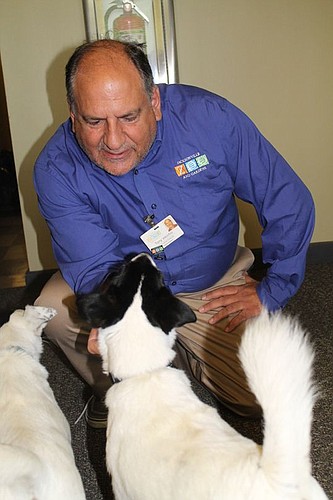
When Tony Vecchio first worked in a zoo as a 14-year-old, there were piano-playing ducks and kissing bunnies. Today there are stingray bays and tiger trails.
Then, zoos were owned by cities and counties. Now, they’re public-private partnerships.
Or, as Vecchio likes to put it, public-private-private-private-private partnerships — with the funding burden falling largely on the private side.
It’s forced leaders like Vecchio to adapt or become extinct.
Fortunately, Vecchio is an adapter. One who likes people almost as much as he does animals. One who thinks zoo profits and zoo missions can overlap.
As director of the Jacksonville Zoo and Gardens, Vechhio oversaw the opening of the Land of the Tiger a year ago — an exhibit he calls “pure mission.”
But he’s equally comfortable with his zoo’s income-earning adaptations — the endangered species carousel, train rides and kayak and airboat tours.
It’s been an evolution for the man who spent his grad school days studying baboon butts.
Vecchio knew from a young age he wanted to work with animals. But it would be many years before he would connect “zoology” to working in a zoo.
A Pittsburgh native, it was “really weird,” he said, that he would end up in a career with animals.
Family vacations were piling the kids into a car to visit the cousins in New Jersey, not camping or fishing. For childhood outings, Vecchio spent more time in museums than at the zoo, which was dirty and smelly.
One day Vecchio told his parents he wanted to work with animals, to be a zoologist.
His dad responded, “There are no jobs for zoologists. You should think about being a vet, they make good money.”
But as an undergrad Vecchio realized he didn’t want to be a doctor, a person the animals really do not like.
He switched to wildlife conservation. He still didn’t think that meant working in a zoo.
“I assumed it meant being Jane Goodall, out in the field studying animals,” he said.
On his first job search, the zoo responded with a position before the state wildlife agency did. It was supposed to be a stepping stone for Vecchio, on the way to being Goodall. Instead, the career stuck.
It was the late 1970s and a great time to be in the zoo business. The old city-worker type of zookeeper was being replaced by young passionate conservationists. The Endangered Species Act passed and the Marine Mammal Protection Act passed. Zoos became serious.
It was all well and good. But, it would set up zoos for another problem years later. As zoos became more scientific they became boring, Vecchio said.
Another force was pressuring the industry as well.
Since the 1960s, zoos — once funded entirely with public money — had marched steadily toward a private business model. Cities and counties faced with budget cuts favored police and firefighters over zoo staff. In Jacksonville today, just 8 percent of the zoo’s budget comes from the city.
Zoos needed ticket-buyers. So, entertainment came back. But this time, with the mission of inspiring people to care about animals.
Ducks don’t actually play the piano, it isn’t real. Jacksonville’s tiger trail, by contrast, actually shows tigers being tigers.
Zookeepers move the tigers between the exhibit and trail and back again throughout the day. Visitors see them doing what they would do in the wild — patrolling their territory, scentmarking, checking out the pigs in an adjacent exhibit.
Vecchio likes to compare animals and nature to art.
“Animals touch you at an emotional and spiritual level,” he said. “So when you see that tiger walking over your head in the tiger trail — that’s an, ‘Oh wow, moment.’”
When people care about animals, they protect them, he said.
The zoo’s evolution of has outpaced its public perceptions. Ninety-nine out of 100 people do not know that conservation is the primary mission.
It’s one of Vecchio’s next challenges, and he’s got a good start.
The secret to effective marketing, he said, is to have a good product.
(904) 356-2466